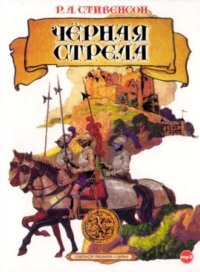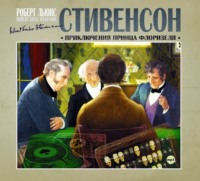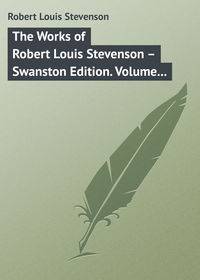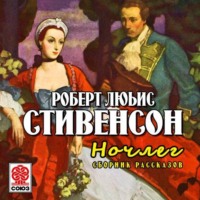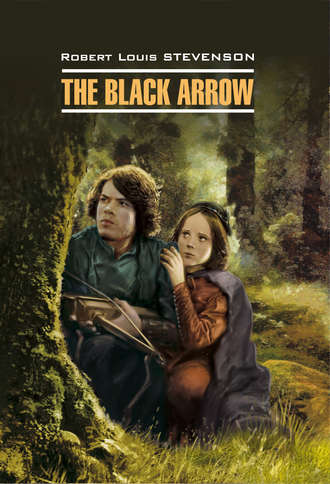
Полная версия
The Black Arrow / Черная Стрела. Книга для чтения на английском языке
“Nay,” returned the other, “y’are too set on meat and drinking, Lawless. Bide ye a bit; the good time cometh.”
“Look ye,” returned the cook, “I have even waited for this good time sith that I was so high. I have been a Grey Friar[27]; I have been a king’s archer; I have been a shipman, and sailed the salt seas; and I have been in greenwood before this, forsooth! and shot the king’s deer. What cometh of it? Naught! I were better to have bided in the cloister. John Abbot availeth more than John Amend-All. By’r Lady! here they come.”
One after another, tall likely fellows began to stroll into the lawn. Each as he came produced a knife and a horn cup, helped himself from the cauldron, and sat down upon the grass to eat. They were very variously equipped and armed; some in rusty smocks, and with nothing but a knife and an old bow; others in the height of forest gallantry, all in Lincoln-green, both hood and jerkin, with dainty peacock arrows in their belts, a horn upon a baldrick, and a sword and dagger at their sides. They came in the silence of hunger, and scarce growled a salutation, but fell instantly to meat.
There were, perhaps, a score of them already gathered, when a sound of suppressed cheering arose close by among the hawthorns, and immediately after five or six woodmen carrying a stretcher debouched upon the lawn. A tall, lusty fellow, somewhat grizzled, and as brown as a smoked ham, walked before them with an air of some authority, his bow at his back, a bright boar-spear in his hand.
“Lads!” he cried, “good fellows all, and my right merry friends, y’have sung this while on a dry whistle and lived at little ease. But what said I ever? Abide Fortune constantly; she turneth, turneth swift. And lo! here is her little firstling – even that good creature, ale!”
There was a murmur of applause as the bearers set down the stretcher and displayed a goodly cask.
“And now haste ye, boys,” the man continued. “There is work toward. A handful of archers are but now come to the ferry; murrey and blue is their wear; they are our butts[28] – they shall all taste arrows – no man of them shall struggle through this wood. For, lads, we are here some fifty strong, each man of us most foully wronged; for some they have lost lands, and some friends; and some they have been outlawed – all oppressed! Who, then, hath done this evil? Sir Daniel, by the rood! Shall he then profit? shall he sit snug in our houses? shall he till our fields? shall he suck the bone he robbed us of? I trow not. He getteth him strength at law; he gaineth cases; nay, there is one case he shall not gain – I have a writ here at my belt that, please the saints, shall conquer him.”
Lawless the cook was by this time already at his second horn of ale. He raised it, as if to pledge the speaker.
“Master Ellis,” he said, “y’are for vengeance – well it becometh you! – but your poor brother o’ the greenwood, that had never lands to lose nor friends to think upon, looketh rather, for his poor part, to the profit of the thing. He had liever a gold noble and a pottle of canary wine[29] than all the vengeances in purgatory.”
“Lawless,” replied the other, “to reach the Moat House, Sir Daniel must pass the forest. We shall make that passage dearer, pardy, than any battle. Then, when he has got to earth with such ragged handful as escapeth us – all his great friends fallen and fled away, and none to give him aid – we shall beleaguer that old fox about, and great shall be the fall of him. ’Tis a fat buck; he will make a dinner for us all.”
“Ay,” returned Lawless, “I have eaten many of these dinners beforehand; but the cooking of them is hot work, good Master Ellis. And meanwhile what do we? We make black arrows, we write rhymes, and we drink fair cold water, that discomfortable drink.”
“Y’are untrue, Will Lawless. Ye still smell of the Grey Friars’ buttery; greed is your undoing,” answered Ellis. “We took twenty pounds from Appleyard. We took seven marks from the messenger last night. A day ago we had fifty from the merchant.”
“And to-day,” said one of the men, “I stopped a fat pardoner riding apace for Holywood. Here is his purse.”
Ellis counted the contents.
“Five-score shillings!” he grumbled. “Fool, he had more in his sandal, or stitched into his tippet. Y’are but a child, Tom Cuckow; ye have lost the fish.”
But, for all that, Ellis pocketed the purse with nonchalance. He stood leaning on his boar-spear, and looked round upon the rest. They, in various attitudes, took greedily of the venison pottage, and liberally washed it down with ale. This was a good day; they were in luck; but business pressed, and they were speedy in their eating. The first-comers had by this time even despatched their dinner. Some lay down upon the grass and fell instantly asleep, like boa-constrictors; others talked together, or overhauled their weapons; and one, whose humour was particularly gay, holding forth an ale-horn, began to sing:
“Here is no law in good green shaw,Here is no lack of meat;’Tis merry and quiet, with deer for our diet,In summer, when all is sweet.Come winter again, with wind and rain —Come winter, with snow and sleet,Get home to your places, with hoods on your faces,And sit by the fire and eat.”All this while the two lads had listened and lain close; only Richard had unslung his crossbow, and held ready in one hand the windac, or grappling-iron that he used to bend it. Otherwise they had not dared to stir; and this scene of forest life had gone on before their eyes like a scene upon a theatre. But now there came a strange interruption. The tall chimney which overtopped the remainder of the ruins rose right above their hiding-place. There came a whistle in the air, and then a sounding smack, and the fragments of a broken arrow fell about their ears. Some one from the upper quarters of the wood, perhaps the very sentinel they saw posted in the fir, had shot an arrow at the chimney-top.
Matcham could not restrain a little cry, which he instantly stifled, and even Dick started with surprise, and dropped the windac from his fingers. But to the fellows on the lawn, this shaft was an expected signal. They were all afoot together, tightening their belts, testing their bow-strings, loosening sword and dagger in the sheath. Ellis held up his hand; his face had suddenly assumed a look of savage energy; the white of his eyes shone in his sun-brown face.
“Lads,” he said, “ye know your places. Let not one man’s soul escape you. Appleyard was a whet before a meal[30]; but now we go to table. I have three men whom I will bitterly avenge – Harry Shelton, Simon Malmesbury, and” – striking his broad bosom – “and Ellis Duckworth, by the mass!”
Another man came, red with hurry, through the thorns.
“’Tis not Sir Daniel!” he panted. “They are but seven. Is the arrow gone?”
“It struck but now,” replied Ellis.
“A murrain!” cried the messenger. “Methought I heard it whistle. And I go dinnerless!”
In the space of a minute, some running, some walking sharply, according as their stations were nearer or farther away, the men of the Black Arrow had all disappeared from the neighbourhood of the ruined house; and the cauldron, and the fire, which was now burning low, and the dead deer’s carcase on the hawthorn, remained alone to testify they had been there.
Chapter V
“Bloody as the Hunter”
The lads lay quiet till the last footstep had melted on the wind. Then they arose, and with many an ache, for they were weary with constraint, clambered through the ruins, and recrossed the ditch upon the rafter. Matcham had picked up the windac and went first, Dick following stiffly, with his cross-bow on his arm.
“And now,” said Matcham, “forth to Holywood.”
“To Holywood!” cried Dick, “when good fellows stand shot? Not I! I would see you hanged first, Jack!”
“Ye would leave me, would ye?” Matcham asked.
“Ay, by my sooth!” returned Dick. “An I be not in time to warn these lads, I will go die with them. What! would ye have me leave my own men that I have lived among? I trow not! Give me my windac.”
But there was nothing further from Matcham’s mind.
“Dick,” he said, “ye sware before the saints that ye would see me safe to Holywood. Would ye be forsworn? Would you desert me – a perjurer?”
“Nay, I sware for the best,” returned Dick. “I meant it too; but now! But look ye, Jack, turn again with me. Let me but warn these men, and, if needs must, stand shot with them; then shall all be clear, and I will on again to Holywood and purge mine oath.”
“Ye but deride me,” answered Matcham. “These men ye go to succour are the same that hunt me to my ruin.”
Dick scratched his head.
“I cannot help it, Jack,” he said. “Here is no remedy. What would ye? Ye run no great peril, man; and these are in the way of death. Death!” he added. “Think of it! What a murrain do ye keep me here for? Give me the windac. Saint George! shall they all die?”
“Richard Shelton,” said Matcham, looking him squarely in the face, “would ye, then, join party with Sir Daniel? Have ye not ears? Heard ye not this Ellis, what he said? or have ye no heart for your own kindly blood and the father that men slew? ‘Harry Shelton,’ he said; and Sir Harry Shelton was your father, as the sun shines in heaven.”
“What would ye?” Dick cried again. “Would ye have me credit thieves?[31]”
“Nay, I have heard it before now,” returned Matcham. “The fame goeth currently, it was Sir Daniel slew him. He slew him under oath; in his own house he shed the innocent blood. Heaven wearies for the avenging on’t; and you – the man’s son – ye go about to comfort and defend the murderer!”
“Jack,” cried the lad, “I know not. It may be; what know I? But, see here: This man hath bred me up and fostered me, and his men I have hunted with and played among; and to leave them in the hour of peril – O, man, if I did that, I were stark dead to honour! Nay, Jack, ye would not ask it; ye would not wish me to be base.”
“But your father, Dick?” said Matcham, somewhat wavering. “Your father? and your oath to me? Ye took the saints to witness.”
“My father?” cried Shelton. “Nay, he would have me go! If Sir Daniel slew him, when the hour comes this hand shall slay Sir Daniel; but neither him nor his will I desert in peril. And for mine oath, good Jack, ye shall absolve me of it here. For the lives’ sake of many men that hurt you not, and for mine honour, ye shall set me free.”
“I, Dick? Never!” returned Matcham. “An ye leave me, y’are forsworn, and so I shall declare it.”
“My blood heats,” said Dick. “Give me the windac! Give it me!”
“I’ll not,” said Matcham. “I’ll save you in your teeth.”
“Not?” cried Dick. “I’ll make you!”
“Try it,” said the other.
They stood, looking in each other’s eyes, each ready for a spring. Then Dick leaped; and though Matcham turned instantly and fled, in two bounds he was overtaken, the windac was twisted from his grasp, he was thrown roughly to the ground, and Dick stood across him, flushed and menacing, with doubled fist. Matcham lay where he had fallen, with his face in the grass, not thinking of resistance.
Dick bent his bow.
“I’ll teach you!” he cried, fiercely. “Oath or no oath, ye may go hang for me!”
And he turned and began to run. Matcham was on his feet at once, and began running after him.
“What d’ye want?” cried Dick, stopping. “What make ye after me? Stand off!”
“I will follow an I please,” said Matcham. “This wood is free to me.”
“Stand back, by’r Lady!” returned Dick, raising his bow.
“Ah, y’are a brave boy!” retorted Matcham. “Shoot!”
Dick lowered his weapon in some confusion.
“See here,” he said. “Y’have done me ill enough. Go, then. Go your way in fair wise; or, whether I will or not, I must even drive you to it.”
“Well,” said Matcham, doggedly, “y’are the stronger. Do your worst. I shall not leave to follow thee, Dick, unless thou makest me,” he added.
Dick was almost beside himself. It went against his heart to beat a creature so defenceless; and, for the life of him[32], he knew no other way to rid himself of this unwelcome and, as he began to think, perhaps untrue companion.
“Y’are mad, I think,” he cried. “Fool-fellow, I am hasting to your foes; as fast as foot can carry me, go I thither.”
“I care not, Dick,” replied the lad. “If y’are bound to die, Dick, I’ll die too. I would liever go with you to prison than to go free without you.”
“Well,” returned the other, “I may stand no longer prating. Follow me, if ye must; but if ye play me false[33], it shall but little advance you, mark ye that. Shalt have a quarrel in thine inwards, boy.”
So saying, Dick took once more to his heels, keeping in the margin of the thicket, and looking briskly about him as he went. At a good pace he rattled out of the dell, and came again into the more open quarters of the wood. To the left a little eminence appeared, spotted with golden gorse, and crowned with a black tuft of firs.
“I shall see from there,” he thought, and struck for it across a heathy clearing.
He had gone but a few yards, when Matcham touched him on the arm, and pointed. To the eastward of the summit there was a dip, and, as it were, a valley passing to the other side; the heath was not yet out; all the ground was rusty, like an unscoured buckler, and dotted sparingly with yews; and there, one following another, Dick saw half a score green jerkins mounting the ascent, and marching at their head, conspicuous by his boar-spear, Ellis Duckworth in person. One after another gained the top, showed for a moment against the sky, and then dipped upon the further side, until the last was gone.
Dick looked at Matcham with a kindlier eye.
“So y’are to be true to me, Jack?” he asked. “I thought ye were of the other party.”
Matcham began to sob.
“What cheer!” cried Dick. “Now the saints behold us! would ye snivel for a word?”
“Ye hurt me,” sobbed Matcham. “Ye hurt me when ye threw me down. Y’are a coward to abuse your strength.”
“Nay, that is fool’s talk,” said Dick, roughly. “Y’had no title to my windac, Master John. I would ’a’ done right to have well basted you. If ye go with me, ye must obey me; and so, come.”
Matcham had half a thought to stay behind; but, seeing that Dick continued to scour full-tilt towards the eminence, and not so much as looked across his shoulder, he soon thought better of that[34], and began to run in turn. But the ground was very difficult and steep; Dick had already a long start, and had, at any rate, the lighter heels, and he had long since come to the summit, crawled forward through the firs, and ensconced himself in a thick tuft of gorse, before Matcham, panting like a deer, rejoined him, and lay down in silence by his side.
Below, in the bottom of a considerable valley, the short cut from Tunstall hamlet wound downwards to the ferry. It was well beaten, and the eye followed it easily from point to point. Here it was bordered by open glades; there the forest closed upon it; every hundred yards it ran beside an ambush. Far down the path, the sun shone on seven steel salets, and from time to time, as the trees opened, Selden and his men could be seen riding briskly, still bent upon Sir Daniel’s mission. The wind had somewhat fallen, but still tussled merrily with the trees, and, perhaps, had Appleyard been there, he would have drawn a warning from the troubled conduct of the birds.
“Now, mark,” Dick whispered. “They be already well advanced into the wood; their safety lieth rather in continuing forward. But see ye where this wide glade runneth down before us, and in the midst of it, these two-score trees make like an island? There were their safety. An they but come sound as far as that, I will make shift to warn them. But my heart misgiveth me; they are but seven against so many, and they but carry crossbows. The long-bow, Jack, will have the uppermost ever.”
Meanwhile, Selden and his men still wound up the path, ignorant of their danger, and momently drew nearer hand. Once, indeed, they paused, drew into a group, and seemed to point and listen. But it was something from far away across the plain that had arrested their attention – a hollow growl of cannon that came, from time to time, upon the wind, and told of the great battle. It was worth a thought, to be sure; for if the voice of the big guns were thus become audible in Tunstall Forest, the fight must have rolled ever eastward, and the day, by consequence, gone sore against Sir Daniel and the lords of the dark rose[35].
But presently the little troop began again to move forward, and came next to a very open, heathy portion of the way, where but a single tongue of forest ran down to join the road. They were but just abreast of this, when an arrow shone flying. One of the men threw up his arms, his horse reared, and both fell and struggled together in a mass. Even from where the boys lay they could hear the rumour of the men’s voices crying out; they could see the startled horses prancing, and, presently, as the troop began to recover from their first surprise, one fellow beginning to dismount. A second arrow from somewhat farther off glanced in a wide arch; a second rider bit the dust[36]. The man who was dismounting lost hold upon the rein, and his horse fled galloping, and dragged him by the foot along the road, bumping from stone to stone, and battered by the fleeing hoofs. The four who still kept the saddle instantly broke and scattered; one wheeled and rode, shrieking, towards the ferry; the other three, with loose rein and flying raiment, came galloping up the road from Tunstall. From every clump they passed an arrow sped. Soon a horse fell but the rider found his feet and continued to pursue his comrades till a second shot despatched him. Another man fell; then another horse; out of the whole troop there was but one fellow left, and he on foot; only, in different directions, the noise of the galloping of three riderless horses was dying fast into the distance.
All this time not one of the assailants had for a moment showed himself. Here and there along the path, horse or man rolled, undespatched, in his agony; but no merciful enemy broke cover to put them from their pain.
The solitary survivor stood bewildered in the road beside his fallen charger. He had come the length of that broad glade, with the island of timber, pointed out by Dick. He was not, perhaps, five hundred yards from where the boys lay hidden; and they could see him plainly, looking to and fro in deadly expectation. But nothing came; and the man began to pluck up his courage, and suddenly unslung and bent his bow. At the same time, by something in his action, Dick recognised Selden.
At this offer of resistance, from all about him in the covert of the woods there went up the sound of laughter. A score of men, at least, for this was the very thickest of the ambush, joined in this cruel and untimely mirth. Then an arrow glanced over Selden’s shoulder; and he leaped and ran a little back. Another dart struck quivering at his heel. He made for the cover. A third shaft leaped out right in his face, and fell short in front of him. And then the laughter was repeated loudly, rising and re-echoing from different thickets.
It was plain that his assailants were but baiting him, as men, in those days, baited the poor bull, or as the cat still trifles with the mouse. The skirmish was well over; farther down the road, a fellow in green was already calmly gathering the arrows; and now, in the evil pleasure of their hearts, they gave themselves the spectacle of their poor fellow-sinner in his torture.
Selden began to understand; he uttered a roar of anger, shouldered his crossbow, and sent a quarrel at a venture into the wood. Chance favoured him, for a slight cry responded. Then, throwing down his weapon, Selden began to run before him up the glade, and almost in a straight line for Dick and Matcham.
The companions of the Black Arrow now began to shoot in earnest[37]. But they were properly served; their chance had passed; most of them had now to shoot against the sun; and Selden, as he ran, bounded from side to side to bafflfe and deceive their aim. Best of all, by turning up the glade he had defeated their preparations; there were no marksmen posted higher up than the one whom he had just killed or wounded; and the confusion of the foresters’ counsels soon became apparent. A whistle sounded thrice, and then again twice. It was repeated from another quarter. The woods on either side became full of the sound of people bursting through the underwood; and a bewildered deer ran out into the open, stood for a second on three feet, with nose in air, and then plunged again into the thicket.
Selden still ran, bounding; ever and again an arrow followed him, but still would miss. It began to appear as if he might escape. Dick had his bow armed, ready to support him; even Matcham, forgetful of his interest, took sides at heart for the poor fugitive; and both lads glowed and trembled in the ardour of their hearts.
He was within fifty yards of them, when an arrow struck him, and he fell. He was up again, indeed, upon the instant; but now he ran staggering, and, like a blind man, turned aside from his direction.
Dick leaped to his feet and waved to him.
“Here!” he cried. “This way! here is help! Nay, run, fellow – run!”
But just then a second arrow struck Selden in the shoulder, between the plates of his brigandine, and, piercing through his jack, brought him, like a stone, to earth.
“Oh, the poor heart!” cried Matcham, with clasped hands.
And Dick stood petrified upon the hill, a mark for archery.
Ten to one he had speedily been shot – for the foresters were furious with themselves, and taken unawares by Dick’s appearance in the rear of their position – but instantly out of a quarter of the wood surprisingly near to the two lads, a stentorian voice arose, the voice of Ellis Duckworth.
“Hold!” it roared. “Shoot not! Take him alive! It is young Shelton – Harry’s son.”
And immediately after a shrill whistle sounded several times, and was again taken up and repeated farther off. The whistle, it appeared, was John Amend-All’s battle trumpet, by which he published his directions.
“Ah, foul fortune!” cried Dick. “We are undone. Swiftly, Jack, come swiftly!”
And the pair turned and ran back through the open pine clump that covered the summit of the hill.
Chapter VI
To the Day’s End
It was, indeed, high time for them to run.[38] On every side the company of the Black Arrow was making for the hill. Some, being better runners, or having open ground to run upon, had far outstripped the others, and were already close upon the goal; some, following valleys, had spread out to right and left, and outflanked the lads on either side.
Dick plunged into the nearest cover. It was a tall grove of oaks, firm under foot and clear of underbrush, and as it lay down hill, they made good speed. There followed next a piece of open, which Dick avoided, holding to his left. Two minutes after, and the same obstacle arising, the lads followed the same course. Thus it followed that, while the lads, bending continually to the left, drew nearer and nearer to the high road and the river which they had crossed an hour or two before, the great bulk of their pursuers were leaning to the other hand, and running towards Tunstall.
The lads paused to breathe. There was no sound of pursuit. Dick put his ear to the ground, and still there was nothing; but the wind, to be sure, still made a turmoil in the trees, and it was hard to make certain.
“On again!” said Dick; and, tired as they were, and Matcham limping with his injured foot, they pulled themselves together, and once more pelted down the hill.
Three minutes later, they were breasting through a low thicket of evergreen. High overhead, the tall trees made a continuous roof of foliage. It was a pillared grove, as high as a cathedral, and except for the hollies among which the lads were struggling, open and smoothly swarded.
On the other side, pushing through the last fringe of evergreen, they blundered forth again into the open twilight of the grove.
“Stand!” cried a voice.
And there, between the huge stems, not fifty feet before them, they beheld a stout fellow in green, sore blown with running, who instantly drew an arrow to the head and covered them. Matcham stopped with a cry; but Dick, without a pause, ran straight upon the forester, drawing his dagger as he went. The other, whether he was startled by the daring of the onslaught, or whether he was hampered by his orders, did not shoot: he stood wavering; and before he had time to come to himself, Dick bounded at his throat, and sent him sprawling backward on the turf. The arrow went one way and the bow another with a sounding twang. The disarmed forester grappled his assailant; but the dagger shone and descended twice. Then came a couple of groans, and then Dick rose to his feet again, and the man lay motionless, stabbed to the heart.







